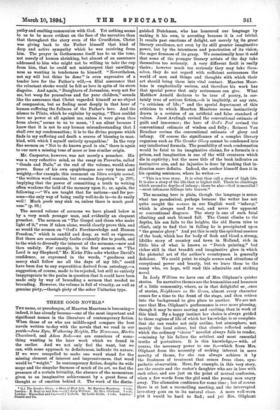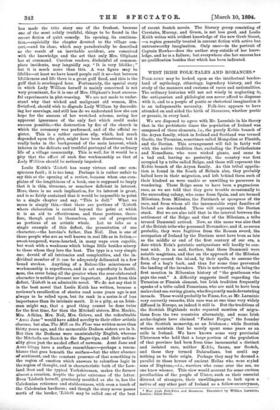THREE GOOD NOVELS.*
THE name, or pseudonym, of Maarten Maartens is becoming— indeed, it has already become—one of the most important and significant names in the literature of contemporary fiction. When those of us who are middle-aged compare the best novels written to-day with the novels that we read in our youth—Jane Eyre, Wuthering Heights, The Newcomer, Martin Ch,uzzlewit, and Adam Bede—we are conscious of some- thing wanting in the later work which we found in the earlier. And we not only feel the want, but we can, with some approach to definiteness, indicate its nature. If we were compelled to make one word stand for the missing element of interest and impressiveness, that word would be "weight." In contemporary fiction, despite its wide scope and the singular fineness of much of its art, we feel the presence of a certain triviality, the absence of the momentum given to an imaginative achievement by a great force of thought or of emotion behind it. The work of the diatin-
• (1.) The Greater Glory : a Story of High Life. By Maarten Maartens. 3 vols. London : R. Bent'ey and Son.—(2 ) Lady WiWant. By Mrs. Oliphant. 3 vols. London : Macmillan and Co.—(3 ) 'Lisbeth. By Leslie Keith. 3 vols. London :
Cassell and Co.
guished Dutchman, who has honoured our language by making it his own, is arresting because it is not trivial.
It recalls past emotions of delight, not merely by its great literary excellence, not even by its still greater imaginative power, but by the intentness and penetration of its vision, the eager firmness of its grasp. We occasionally hear it said that some of the younger literary artists of the day take themselves too seriously. A very different fault is really
theirs ; however much too seriously they may take them- selves, they do not regard with sufficient seriousness the world of men and things and thoughts with which their
art should bring them into vital contact. Maarten Hear- tens is emphatically serious, and therefore his work has that special power that only seriousness can give. What Matthew Arnold declares to be true of poetry, is cer- tainly true of serious fiction,—it is implicitly, at any rate, "a criticism of life ; " and the special department of this criticism to which Maarten Martens seems instinctively drawn is a revision of an artificial and false standard of values. Joost Avelingh revised the conventional estimate of
guilt and innocence ; the hero of God's Fool revised the conventional estimate of wisdom and folly ; Reinout Van Rexelaer revises the conventional estimate of glory and infamy. Of course the significance of a complex literary organism such as The Greater Glory cannot be condensed into any intellectual formula. The possibility of such condensation
would be fatal to its imaginative claims, for a formula is a prison, and imagination is one of the wild creatures which die in captivity; but the mere title of the book indicates an instinctive aim, and no injustice is done by making that in- dication more definite. Indeed, the author himself does it in his opening sentences, where he writes :--
"This is a true story. It is what they call a story of high life. It is also a story of the life that is higher still. There be climbings which ascend to depths of infamy; there be also—God is merciful —most infamous fallings into heaven."
The meaning here is plain, though the language is some- what too paradoxical, perhaps because the writer has not quite caught the nuance in our English word "infamy,"
which is always used for real, and never for apparent or conventional disgrace. The story is one of such fatal climbing and such blessed fall. The Count climbs to the depths, his son falls to the heights, the old Baron tries to climb, only to find that in falling he is precipitated upon "the greater glory." And yet this is only the spiritual essence of the book, which has for body of flesh and blood a strong, lifelike story of country and town in Holland, rich in little bits of what is known as "Dutch painting," but richer still in that breadth and imaginative glow in which the pictorial art of the author's countrymen is generally deficient. We could point to single scenes and situations of exceptional power and beauty, but we leave them to the many who, we hope, will read this admirable and striking novel.
In Lady William we have one of Mrs. Oliphant's quieter stories. Its narrative themes are the humanities and humours of a little community, where, as in that delightful se,..ence of stories, Neighbours on the Green, almost every character comes for a time to the front of the stage, and then retires into the background to give place to another. We are not sure that Mrs. Oliphant's performance is ever more pleasing,
though it may be more moving and exciting; than in work of this kind. By a happy instinct her choice is always guided to those regions of life of which her knowledge is so complete that she can render not only outline, but atmosphere, not merely the local colour, but that elusive reflected colour which the ordinary "clever" novelist always fails to render, —missing by his failure the subtlest and most essential truths of portraiture. It is this knowledge,— with, of course, the necessary power to use it,—which frees Mrs. Oliphant from the necessity of seeking interest in mere novelty of theme, for she can always achieve it by the freshness of treatment that comes from close, sym- pathetic observation. Here, for example, in this very story, are the curate and the rector's daughter who are in love with each other, and are just on the point of mutual confession, when a few words from the girl send the young man angry away. The alienation continues for some time ; but of course there is at last a reconciling meeting, and the interrupted love-story goes on to its natural close. A more well-worn plot it would be hard to find ; and yet Mrs. Oliphant
has made the trite story one of the freshest, because one of the most subtly truthful, things to be found in the recent fiction of quiet comedy. Its opening, its continua- tion,—especially the chapter devoted to the village con- cert, —and its close, which may paradoxically be described as the result of an inevitable accident, are conceived with the knowledge and the art that only Mrs. Oliphant has at command. Careless readers, disdainful of common- place incidents, may languidly say, "It is very lifelike ; " but it is much more than this. A wax figure may be lifelike—at least we have heard people call it so—bat between lifelikeness and life there is a great gulf fixed, and this is the gulf that is overleaped here. Fortunately, the special story in which Lady William herself is mainly concerned is not very prominent, for it is one of Mrs. Oliphant's least success- ful experiments in plot-weaving. We are not made to under- stand why that wicked and malignant old woman, Mrs. Svrinford, should wish to dtgrade Lady William by discredit- ing her marriage, and still less do we understand how she can hope for the success of her wretched scheme, seeing her apparent ignorance of the only fact which could make success possible,—the destruction by fire of the church in which the ceremony was performed, and of the official re- gister. This is a rather careless slip, which, had much depended upon the plot, might have been disastrous; but it really lurks in the background of the main interest, which inheres in the delicate and truthful portrayal of the ordinary life of a village community. This is well, for it would be a pity that the effect of such fine workmanship as that of Lady William should be seriously impaired.
Leslie Keith's 'Lisbeth has many virtues and one con- spicuous fault ; it is too long. Perhaps it is rather unfair to say this at the opening of a review, because when one com- plains of the lengthiness of a book, one is supposed to imply that it is thin, tiresome, or somehow deficient in interest. Here, there is no such implication, for its interest is great, and is so fairly sustained that it would be impossible to point to a single chapter and say, "This is dull." What we mean is simply this,—that there are portions of 'Lisbeth where elaboration is carried beyond the point at which it is an aid to effectiveness, and these portions, there- fore, though good in themselves, are out of proportion as portions of an artistic whole. Let us take as a single example of this defect, the presentation of one oharacter,—the heroine's father, Dan Neil. Dan is one of those people who are as well known in real life as in fiction,- sweet-tempered, warm-hearted, in many ways even capable, but weak with a weakness which brings little besides misery to those whom they love the best. The type is a very simple one, devoid of all intricacies and complexities, and the in- dividual member of it can be adequately delineated in a few broad strokes. Anything of a Balzac-like minuteness of workmanship is superfluous, and in art superfluity is faulti- aess, the error being all the greater when the over-elaborated character is neither pleasant nor important. Apart from this defect, 'Lisbeth is an admirable novel. We do not say that it is the best novel that Leslie Keith has written, because a reviewer's recollection of stories read some years ago is not always to be relied upon, but its rank in a series is of less importance than its intrinsic merit. It is a pity, as an Irish- man might say, that a good thing cannot be done twice for the first time, for then the Mitchell sisters, Mrs. Mackie, Mrs. Adkins, Mrs. Neil, Mrs. Grieve, and the redoubtable "Aunt Jane" would have added novelty to their other artistic charms; but alas, The Mill on the Floss was written more than thirty years ago, and the memorable Dodson sisters are in it. But then the Dodsons were unmistakably English, whereas the Mitchells are Scotch to the finger-tips, and their nation- ality gives just the needed effect of newness. Aunt Jane and Aunt Glegg have a surface resemblance—perhaps a resem- blance that goes beneath the surface—but the utter absence ef sentiment, and the constant presence of that something in the region of emotion which answers to relentless logic in the region of thought, and is characteristic both of the Low- land Scot and the typical Yorkshireman, makes the former almost a creation, despite the prior existence of the latter. Even 'Lisbeth herself, graciously moulded as she is, has the Caledonian reticence and stubbornness, with even a touch of the Caledonian hardness ; and though the story never passes north of the border, 'Lisbeth may be called one of the best of recent Scotch novels. The literary group consisting of Carstairs, Murray, and Green, is not less good, and Leslie Keith writes with evident knowledge of the new Grub Street, —a region generally treated in current fiction with active but untrustworthy imagination. Only once—in the portrait of Captain Hawke—does the author step outside of her know- ledge, and he is a failure; but everywhere else her success has no qualification besides that which has been indicated.







































 Previous page
Previous page